It wasn’t one of those windstorms that made the news last summer in central Montana. TV coverage might have included the weatherman on the local Helena ABC affiliate remarking about how “it sure was windy today,” although seemingly minor events can make the news on a slow day. Just this week, a squirrel got zapped in an electrical substation, cutting power to thousands in Helena. But, as I said, it wasn’t a windstorm that made me rush to social media after I got off the Missouri with Craig DeMark just to let the rest of the world know I was safe from the Missouri River Gale of 2024.
But damn that wind. Damn it all to hell. On an otherwise perfectly sunny and pleasant June afternoon on the Missouri, the wind rushed up the river’s canyon stretch and proceeded to tangle my cast and foul my leader as I tried to put a size 22 baetis imitation in the feeding lane of a beefy brown trout that Craig was sure measured two whole feet in length. From about 25 feet out, as Craig held the boat tight in that god-awful bluster, I managed to get two eats in about an hour’s worth of casting.
Each time the head the size of a softball pushed out of the water to grab my fly, I managed to offer a reprieve and lift the fly away before the big fish could gulp it down. It wouldn’t have been a big deal, save for the fact that for the other 59 minutes spent working one damned fish were completely spoiled by brutal wind gusts that came out of nowhere, ejected hats from heads, and blew out any flame of hope that I’d ever hook the behemoth which, by the time we gave up and made for the take-out so we could be back at the lodge for dinner, had magically grown two inches.
“You know,” Craig said to me as we rounded the bend and the take-out appeared on the river’s right bank, “I think that fish might have been bigger than I initially suspected. Maybe 26.”
Up yours, Craig.
I was pouting. A foul mood for a foul wind. But, damn, that fish was big. Like … massive. The distance between dorsal fin and its tail was an eternity, and it just kept rising to the littlest of the little bugs that could somehow pop on a day when you really had to lean in to stand upright. Was it eating baetis? Probably not. But the baetis was the fly we could see, and the fish tried for it a couple of times, so, while the miniscule blue-winged olive fly likely wasn’t the main item on the buffett, it was at least as appealing as the hush puppies or the mashed potatoes.
And that’s the story that’s fairly familiar on rivers — particularly very fertile tailwaters — across the West. See the fish rise. Wait. See the fish rise again, just to make sure you’re not imagining things. Cast to the fish. Hope like hell that Hurricane Helena doesn’t spin up out of nowhere and send your light leader and tippet into a streamside wild rose bush and, in time, put a fly on just the right feeding lane, with just enough of an upstream reach cast to eliminate the drag and catch the fish.
As my friend Tim Linehan, who guides on the Missouri in the spring and then on the Kootenai all summer long, is fond of saying when things don’t go exactly as they’re supposed to go on the river, “I hate fishing.”
Now, of course, I don’t hate fishing. Not even a little. But there are days — like that day on the Missouri last summer, when Mother Nature spun up a gag and played it on me and Craig in the iconic canyon stretch of the river — when I’m humbled by fly fishing. Having been at it for the better part of half a century, it’s a miracle I’ve stuck with it. And, some would say, it’s a miracle that, after all these years of fly fishing, I still haven’t learned to deal with the wind.
Well, this wasn’t just “wind.” Wind is what you get on a normal day on the Belizean, Bahamian or Roatanian flats. Wind is something you can begin to conquer if you spend a day on the water with someone like John Juracek who can spot a casting flaw a mile away and then, with the patience, grace and the aptitude of a Buddhist monk, explain to you how to beat the wind by trying a little less hard and casting a little smarter (and by revealing at least one of the universe’s best-kept secrets — “It’s all in your head, brother.”).
This wasn’t wind. This was fury funneled between two walls of granite, powered by a tailwater-cold river, and unleashed at our feet by some invisible, meteorological titan. It was a storm without rain. A blizzard without snow. That’s what this was.
By about the tenth time the gale picked up just as I was delivering that modest little fly, tied delicately to the tippet that was attached to a good 14 feet of supple nylon leader, and sent the whole outfit shooting off into the riverside snarls of willows and rose bushes, I’d about had it. To his credit, Craig hung in there. And, also to his credit, he recognized that I was really trying — that I was applying all the tips I could remember from a vast collection of expert tips on dealing with the wind, only to fail time and again.
And, yeah, I got the fish to eat. Twice. Of course, I flubbed those chances, too. After the second time the massive brown zeroed in on the fly with a nary a sting to show for it, I glanced at Craig with a look of utter hopelessness. He nodded. I was done. He was done. I needed a stiff drink and some shelter from the near-constant, in-my-face wind. And, of course, the humiliation of it all.
Later, with my feet up and a globe of ice perfectly covered by a generous pour of Tullamore D.E.W., I was past the frustration. It helped, too, that, when I got back to the lodge, my fishing buddy for the week had endured an eerily similar experience. Like me, he worked a big fish for the better part of an hour with nothing to show for it.
“I’d make what I thought was the perfect cast on just the right line and just as I’d go to release the cast, the wind would blow up, take my hat off my head and send my fly into the weeds,” he said. Ah, misery loves company. We drank our whiskey and watched the riverside trees bend and creak in the miserable wind outside Craig’s quiet little lodge on the river between Craig and Cascade.
I looked across the table at my buddy, and raised my glass.
“Tomorrow’s another day,” I said. “But right now, I hate fishing.”








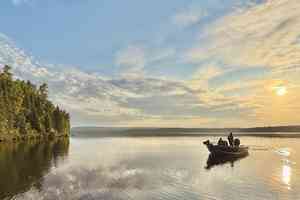


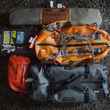

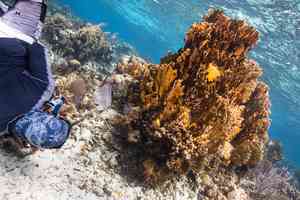





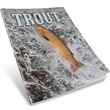
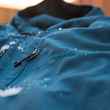





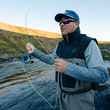
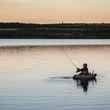
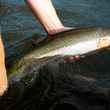
Comments
Geoff Roznak replied on Permalink
A fun read, thanks...
I would have used a streamer. [wink]
Pages